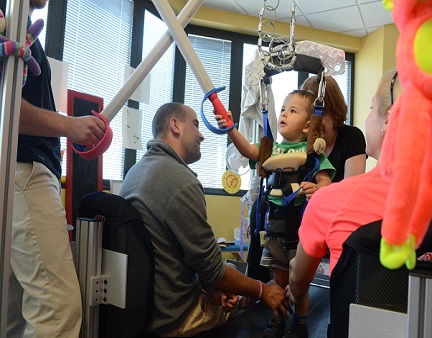Our studies are focused on four main priorities:
Ongoing Studies
The Scientific Foundation: Building Evidence for Activity-based Therapies for Children with ParalysisThe goal of this project is to advance the understanding of the mechanisms and outcomes associated with activity-based therapies for children affected by paralysis and promote its dissemination to scientific and pediatric rehabilitation communities. Our aims are to 1) conduct proof-of-principle studies, 2) develop pediatric-specific measurement tools, and 3) conduct critical studies examining mechanisms and outcomes of recovery via activity-based therapy. Funding: Leona M. and Harry B. Helmsley Charitable Trust (2015-2018) Power Kids: A Neuromuscular Training System Specifically Designed To Promote Recovery in Children with ParalysisThe goal of this project is to develop a prototype for a Pediatric Neuromuscular Training system that can move to commercialization. Funding: Coulter Translational Research Award (2015-2018) Advancing a New Trajectory of Outcomes for Children with Paralysis through Activity-based RehabilitationThe overall goal of this study is to change dramatically the course of outcomes for children affected by paralysis and their families by augmenting and accelerating research and rehabilitation programs. Three specific aims include: 1) development of a research training system (Fig. 11), 2) development of a long-term database for outcomes, healthcare utilization and quality of life, and 3) assessment of varied sensory inputs (e.g., cold, texture) to augment current therapy. Funding: Leona M. and Harry B. Helmsley Charitable Trust (2014-2017) Crawford KidsTodd Crawford Foundation provides financial support for families so that their child can participate in annual follow-up evaluations and research sessions. Funding: Todd Crawford Foundation (2014-ongoing) Respiratory and Trunk Control in Children with Spinal Cord InjuryThe goal of this project is to 1) assess the impact of SCI on respiratory and trunk control in children after SCI and 2) identify the relationship between the two abilities that use common muscles for function. Funding: Kosair for Kids (in-part) Segmental Assessment of Trunk Control (SATCo) in Children with Spinal Cord InjuryThe goal of this study is to assess whether the SATCo captures differences in trunk control among children with SCI and is responsive to change associated with therapeutic interventions. This tool has been validated in developing infants and children with cerebral palsy. Our aim is to examine and potentially extend its utility to children with spinal cord injury. Funding: Kosair for Kids and the Christopher and Dana Reeve Foundation NeuroRecovery Network Cardiovascular Performance in Children after Spinal Cord Injury and Activity-based TherapySimilar to adults, our knowledge of the impact of SCI on cardiovascular (CV) function is limited for the pediatric population. In the adult population with chronic SCI, morbidity and mortality from disease now exceeds that caused by renal and pulmonary conditions seen in previous decades. With CV dysfunction due to SCI and the ensuing sedentary lifestyle, many changes contribute to early onset of coronary disease for adults after SCI. For those injured as children the consequences are unknown. This study will examine CV function in children after SCI and as a result of activity-based therapy. Funding: Kosair Charities and the Leona M. and Harry B. Helmsley Charitable Trust Exploring Neuromuscular Electrical Stimulation (NMES) as an Activity-based Therapy in the Pediatric Population Post-SCIThe purpose of this work is to explore the feasibility and safety of NMES in the pediatric population. Use of NMES is in line with provision of augmented sensory input to the spinal cord to generate a motor output as a therapeutic intervention to activate the neuromuscular system below the lesion. Funding: Kosair Charities
Primary Researchers
|
The Kosair for Kids Center for Recovery-Based Therapies: Pediatric NeuroRecovery Research |





